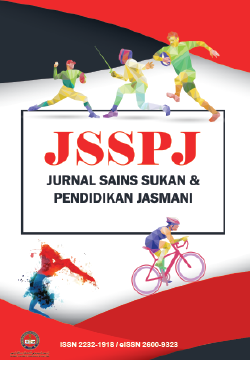Social Cognitive Determinants of Physical Activity Participation among Vaccinated Malaysians
DOI:
https://doi.org/10.37134/jsspj.vol12.2.8.2023Keywords:
physical activity participation, social cognitive theory, COVID-19, vaccinated Malaysian, multiple linear regressionAbstract
Physical inactivity is a global public health concern associated with various adverse health outcomes. The pandemic restrictions on outdoor activities have caused physical activity levels to decrease by 6.3% globally. After vaccination is introduced, many individuals may feel more confident and safer to engage in physical activities but no fixed percentage of increased physical activity participation. This study aims to measure the social cognitive determinants of physical activity participation among vaccinated Malaysians. A total of 372 respondents, who had received vaccinations, were recruited for this study. The participants were selected from different age groups and genders in Malaysia. Multiple linear regression analysis was conducted to measure the relationship between the social cognitive determinants and physical activity participation among vaccinated Malaysians. The results revealed a significant relationship between the social cognitive determinants and physical activity participation (β = 0.44, p < 0.001). Self-efficacy (β = 0.44, p = 0.001) was found to be a significant predictor of physical activity participation. Participants with higher levels of self-efficacy were more likely to engage in regular physical activity. Similarly, outcome expectations (β = 0.25, p = 0.039), and goals (β = 0.64, p = 0.001) were positively associated with physical activity participation. In contrast, sociostructural factors demonstrated a negative association with physical activity participation (β = -0.49, p = 0.001). In conclusion, social cognitive theory are effective to promoting increased physical activity participation among vaccinated Malaysians. Understanding the role of social cognitive determinants may provide insights into strategies to promote physical activity among this population.
Downloads
References
Bandura, A. (2001). Social cognitive theory: An agentic perspective. Annual Review of Psychology, 52(1), 1-26.
Bandura, A. (1977). Self-efficacy: toward a unifying theory of behavioral change. Psychological Review, 84(2), 191.
Bandura, A., & Cervone, D. (1986). Differential engagement of self-reactive influences in cognitive motivation. Organizational Behavior and Human Decision Processes, 38(1), 92-113.
Craig, C. L., Marshall, A. L., Sjöström, M., Bauman, A. E., Booth, M. L., Ainsworth, B. E., ... & Oja, P. (2003). International physical activity questionnaire: 12-country reliability and validity. Medicine & Science in Sports & Exercise, 35(8), 1381-1395.
Department of Health and Human Services. (2018, Mac 12). Overweight and Obesity. https://health.gov/healthypeople/objectives-and-data/browse-objectives/overweight-and-obesity
Kroll, T., Kehn, M., Ho, P. S., & Groah, S. (2007). The SCI exercise self-efficacy scale (ESES): development and psychometric properties. International Journal of Behavioral Nutrition and Physical Activity, 4(1), 1-6.
Mir, I. A., Ng, S. K., Mohd Jamali, M. N. Z., Jabbar, M. A., & Humayra, S. (2023). Determinants and predictors of mental health during and after COVID-19 lockdown among university students in Malaysia. PloS One, 18(1), e0280562.
Malaysia's Ministry of Health. Malaysian vaccination programmes (2021, April 23). https://covidnow.moh.gov.my/vaccinations/
Resnick, B., Zimmerman, S. I., Orwig, D., Furstenberg, A. L., & Magaziner, J. (2000). Outcome expectations for exercise scale: utility and psychometrics. The Journals of Gerontology Series B: Psychological Sciences and Social Sciences, 55(6), S352-S356.
Rovniak, L. S., Anderson, E. S., Winett, R. A., & Stephens, R. S. (2002). Social cognitive determinants of physical activity in young adults: a prospective structural equation analysis. Annals of Behavioral Medicine, 24, 149-156.
Sallis, J. F., Grossman, R. M., Pinski, R. B., Patterson, T. L., & Nader, P. R. (1987). The development of scales to measure social support for diet and exercise behaviors. Preventive Medicine, 16(6), 825-836.
Smith. J., Lee. S., Chan, R.. (2021). Sociostructural factors influencing physical activity participation among vaccinated Malaysians. Journal of Health and Society, 25(2), 112-128. https://doi.org/10.1234/jhs.2021.123456
Downloads
Published
Issue
Section
License
Copyright (c) 2023 Aminuddin Mohammad , Wahidah Tumijan

This work is licensed under a Creative Commons Attribution-NonCommercial-ShareAlike 4.0 International License.





